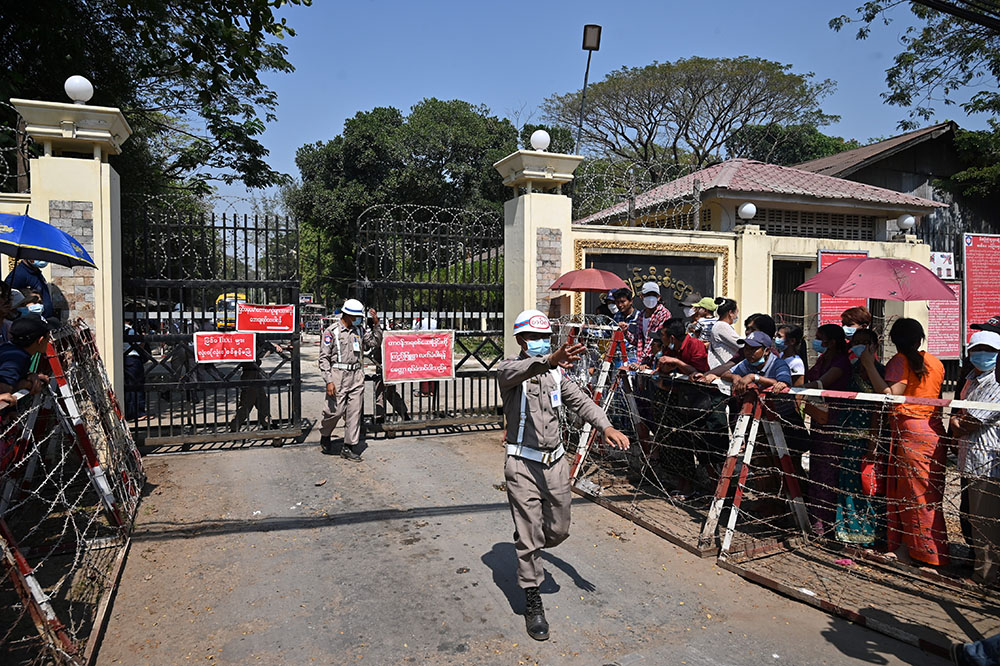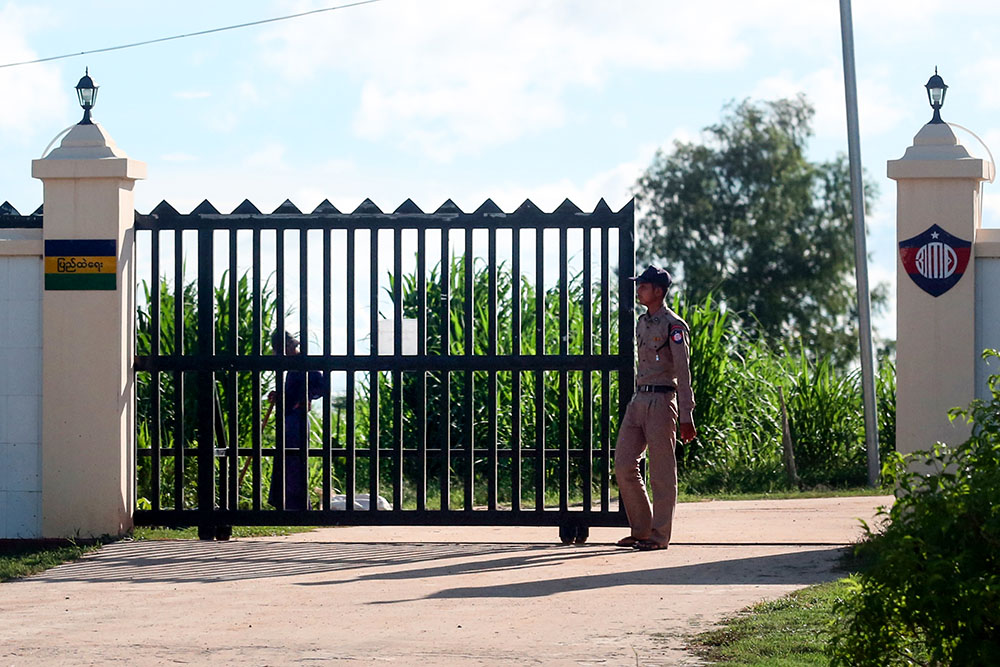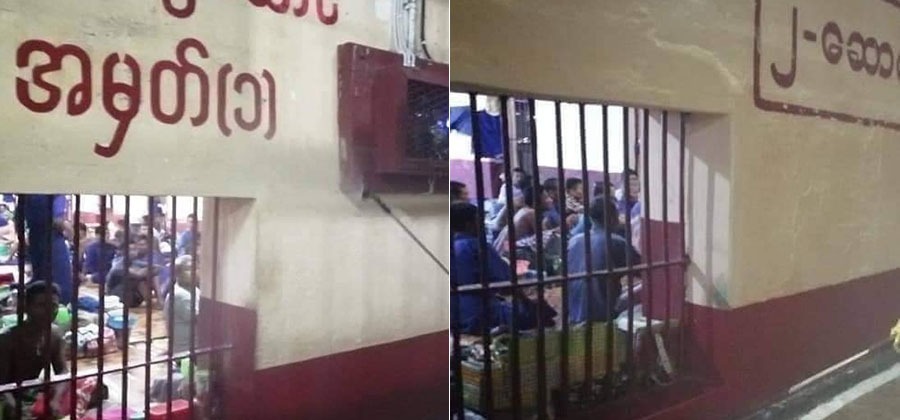Former political prisoner Daw Hnin Si hasn’t forgotten how she and fellow inmates were beaten and tortured in 2021 by prison authorities in Mandalay’s Obo Prison for celebrating Daw Aung San Suu Kyi’s birthday.
Daw Hnin Si, in her early forties, was detained in Obo Prison for three months for participating in anti-regime protests sparked by last year’s coup.
On the morning of June 19, 2021 she and other political prisoners marked Daw Aung San Suu Kyi’s 76th birthday by wearing new clothes, thanaka and roses. Then, in defiance of the military regime, the prison’s nearly 500 political prisoners shouted loud birthday greetings for Suu Kyi, who was under house arrest at the time.
Prison authorities arrived at once. They locked the female prisoners’ cellblock first. Then, they entered the cellblock for male prisoners and beat the political detainees.
“We heard cries of pain from the male cells. The guards pointed guns at us. They said that if we moved, they would shoot,” recalled Daw Hnin Si.
During the protest, one male prisoner was beaten to death and many more were injured.

Moreover, over 200 of the male political prisoners were moved to solitary confinement. Luckily for the female political detainees, they were only given a stern warning.
The incident at Obo Prison in June 2021 was just one example of how political prisoners across Myanmar have kept defying the junta, despite being behind bars and faced with brutal persecution by prison officials.
Following the regime’s crackdowns on the nationwide anti-coup protests, Myanmar today now has some 11,443 political detainees. It’s the largest number Myanmar has ever had, despite the country being rocked by political unrest ever since General Ne Win’s coup of 1962, according to rights group the Assistance Association of Political Prisoners (AAPP).
Myanmar’s prisons are notorious for their poor conditions, rudimentary healthcare and oppressive regimes. It is political prisoners who suffer the most.
The harsh conditions and brutal oppression in the country’s jails have failed to crush the political prisoners’ defiance and revolutionary spirit, as they continue to stage protests against the junta.
Over the last year, there have been at least 22 prison protests. There have been six in Yangon’s Insein Prison, while political detainees in Obo, Pathein, Hpa-an, Monywa and Dawei jails have staged protests, too.
In June 2022 alone, there were at least six prison protests nationwide.
Political prisoners have staged protests to commemorate big political events such as the anniversary of the 1988 pro-democracy uprising, the 1962 7 July student uprising, the birthday of Daw Aung San Suu Kyi, as well as the first anniversary of the ongoing revolution against the present regime.

At least nine inmates have been killed in crackdowns on the prison protests, while hundreds of detainees have been beaten for participating in them.
Ko Bo Kyi, a former political prisoner and the co-founder and joint secretary of the AAPP, said that staging political protests in jail is an expression of prisoners’ dignity.
“They do it because they have faith in their cause. They all know that there will be crackdowns [if they stage protests],” he said.
Prison protests and bloody crackdowns
There are 44 prisons and 50 labor camps across Myanmar. Political prisoners are detained in Insein Prison, Obo Prison, Monwya Prison in Sagaing Region, Dawei Prison in Tanintharyi Region, Hpa-An Prison in Karen State, Taunggyi Prison in Shan State and Pathein Prison in Ayeyarwady Region, as well as other jails nationwide.
Yangon’s notorious Insein Prison is currently holding over 1,000 political detainees. Obo Prison has around 600 political prisoners, while Pathein’s jail has more than 300 political prisoners and Dawei Prison has nearly 500 political prisoners, according to former political prisoners and prisoner networks.
When more than 20 political prisoners in Obo Prison staged a protest on August 8, 2021 marking the 1988 pro-democracy uprising, prison staff beat the detainees so hard that one inmate vomited blood and later died.
On June 3 this year, political prisoners in Insein Prison staged a hunger strike in protest at the death sentences handed down to four political prisoners, including prominent activist Ko Jimmy and National League for Democracy MP Ko Phyo Zayar Thaw. The protesters were moved to cellblocks with criminals as punishment.
Solitary confinement is one of the most common forms of punishment for political prisoners. Almost all inmates who protest are put in solitary confinement. Moreover, inmates’ family members have been banned from visiting prisons, with the junta using the COVID-19 pandemic as an excuse.
Daw Myo Myo Aye, a labor activist as well as a former political prisoner who spent around six months in Insein after the coup, was placed in solitary confinement for 45 days after being accused of planning a protest.
She and political prisoners had previously protested on anniversaries of significant political events to show solidarity with their fellow anti-junta activists who were still free. So prison officials moved her to solitary confinement, she told The Irrawaddy.

“I was put in solitary confinement simply because I defied them,” she said.
Prison conditions
Corruption among prison officials and the lack of justice makes the administration system of jails even more cruel and inhumane, according to the AAPP. In some cases, officials ordered criminals to torture the political prisoners. An AAPP report revealed that overcrowding, a lack of food and mental and physical torture threaten the life of prisoners.
Prison is the worst for human rights violations, said U Tun Kyi, a fiftysomething former political prisoner who spent six years in the infamous Myingyan Prison in Mandalay Region between 1991 and 1996. Hundreds of prisoners died in Myingyan in the 1990s, as they couldn’t get proper healthcare and were tortured by prison staff.
U Tun Kyi said that they also staged prison protests that were brutally crushed as prison officials got inmates imprisoned for crimes to oversee the political detainees.
He said protesting prisoners were placed in solitary confinement, forced to wear shackles, refused permission to wash and were banned from receiving family visits. Prisoners were also beaten with belts.
The AAPP’s Ko Bo Kyi said that the current overall situation political detainees are facing is worse than what he faced when he was imprisoned between 1990 to 1998, citing the increasing number of political prisoners, the mistreatment they suffer and the rising number of people dying during interrogations.
He said that the regime might have thought for a few months in 2021 that they could control people’s protests against their rule. Now, more than one year on, the junta still can’t control the country, as many of the anti-coup protesters have taken up armed resistance to the regime.
“Rather than treating political prisoners according to the law, I think the regime is taking inhumane revenge on political prisoners,” said Ko Bo Kyi.
Revolutionary spirit of political prisoners
Former political prisoner U Tun Kyi said that the revolutionary spirit of political prisoners is still strong and that while the regime may imprison political prisoners physically, it is impossible to lock up their spirit, determination and bravery.
Just as his generation of political detainees did, the new generation of political detainees yell anti-regime slogans and sing revolutionary songs as a show of defiance, despite knowing they will be brutally tortured for doing so. They commemorate politically significant days and events from behind bars, so risking their lives.
Last month, on June 20, more than 100 political prisoners in Obo Prison were locked in a putrid fish-paste warehouse, causing vomiting and dizziness, for celebrating Daw Aung San Suu Kyi’s 77th birthday on June 19. Female prisoners made offerings by wearing new clothes, thanaka and flowers. Male prisoners held a football match and played chinlone to mark the occasion.
When Myanmar’s detained leader Daw Aung San Suu Kyi was moved to solitary confinement in Naypyitaw Prison on June 22, the political prisoners detained there sang a revolutionary song in unison to encourage her.
Ko Bo Kyi said that it is the nature of political prisoners always to do or express something politically-related wherever they are and in spite of the risk.
“What they are doing is something to be proud of,” he said.

















